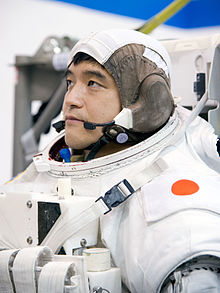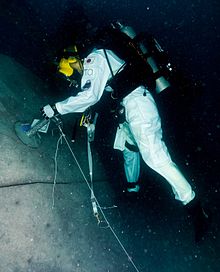Takuya Onishi
Takuya Onishi | |
|---|---|
 | |
| Born | 22 December 1975 Nerima, Tokyo, Japan |
| Status | Active |
| Occupation | Pilot |
| Space career | |
| JAXA astronaut | |
Time in space | 115 days, 2 hours, 22 minutes |
| Selection | |
| Missions | |
Mission insignia | |
Takuya Onishi (大西 卓哉, Ōnishi Takuya, born 22 December 1975) is a Japanese astronaut who was selected for the Japan Aerospace Exploration Agency (JAXA) in 2009.[1] He spent four months on board the International Space Station in 2016.
Early life
[edit]Onishi was born in Nerima, Tokyo, Japan on 22 December 1975.[2] He graduated from Seiko Gakuin High School in Yokohama in 1994 and received a Bachelor of Engineering degree in Aeronautical and Space Engineering from the University of Tokyo in 1998. He joined All Nippon Airways (ANA) in 1998 and was assigned to the Passenger Service Department, Haneda airport, Tokyo, where he was a check-in agent and assisted disabled people in boarding.
Career in aviation
[edit]Onishi completed two years of basic flight training in Bakersfield, California and one year of advanced flight training in Tokyo. He was promoted to co-pilot of Boeing 767 airplanes in October 2003, flying both domestic and international routes.
JAXA career
[edit]
In February 2009, Onishi was selected by the Japanese Aerospace Exploration Agency (JAXA) as one of the Japanese astronaut candidates for the International Space Station (ISS). Starting in April 2009, he attended the ISS Astronaut Basic Training domestic program at Tsukuba Space Center in Japan.[4]
Onishi arrived at NASA's Johnson Space Center in Houston, Texas, in August 2009. As one of the fourteen members of the 20th NASA astronaut class, he took part in an Astronaut Candidate Training program that included scientific and technical briefings, intensive instruction in ISS systems, Extravehicular Activity (EVA), robotics, physiological training, T-38 Talon flight training, and water and wilderness survival training.[4]
Having completed his training as an astronaut, Onishi was given the opportunity to fly to the International Space Station and engage in scientific experiments at the Japanese Experiment Module space laboratory, as well as in the maintenance and operations of the station.
On September 19, 2011, NASA announced that Onishi would serve as an aquanaut aboard the Aquarius underwater laboratory during the NEEMO 15 undersea exploration mission from October 17–30, 2011.[5] Delayed by stormy weather and high seas, the mission began on October 20, 2011.[6][7] On the afternoon of October 21, Onishi and his crewmates officially became aquanauts, having spent over 24 hours underwater. NEEMO 15 ended early on October 26 due to the approach of Hurricane Rina.[6]
In 2019, Onishi participated, with the colleagues Jeanette Epps, Joe Acaba, Alexander Gerst, Nikolai Chub and Joshua Kutryk, in the ESA CAVES[8] training organized by the European Space Agency and held between Italy and Slovenia, becoming a "cavenaut".[9][10]
In 2023, Onishi participated in the ESA PANGAEA training organized by the European Space Agency, held between Italy (Bletterbach canyon), Germany (Noerdlingen-Ries crater) and Spain (Lanzarote Island),[11][12][13] together with colleagues Thomas Pesquet and Jessica Wittner.
Expedition 48/49
[edit]Onishi joined International Space Station Expedition 48/49 as a crew member. The mission successfully launched on July 6, 2016, and Onishi was expected to spend four months at the ISS.[14] He returned to Earth after 115 days in space.
Honors
[edit]Asteroid 163153 Takuyaonishi, discovered by Japanese astronomer Akimasa Nakamura at the Kuma Kogen Astronomical Observatory in 2002, was named in his honor.[15] The official naming citation was published by the Minor Planet Center on 18 February 2011 (M.P.C. 73984).[16]
Personal life
[edit]Onishi enjoys flying, playing the saxophone, movies and hiking.[4]
References
[edit]![]() This article incorporates public domain material from NASA - Meet the NEEMO 15 Crew. National Aeronautics and Space Administration. 2011-09-15. Retrieved 2011-09-19.
This article incorporates public domain material from NASA - Meet the NEEMO 15 Crew. National Aeronautics and Space Administration. 2011-09-15. Retrieved 2011-09-19.
- ^ Two Japanese Picked As Candidates For Astronauts February 26, 2009
- ^ O'Sullivan, John (2019). Japanese Missions to the International Space Station: Hope from the East. Cham, Switzerland: Springer Praxis Books. p. 249. ISBN 9783030045340.
- ^ Onishi, Takuya (October 22, 2011). "NEEMO 15 - Mission Day 2 Blog". NASA. Archived from the original on October 24, 2011. Retrieved October 25, 2011.
- ^ a b c NASA (September 15, 2011). "NASA - Meet the NEEMO 15 Crew". NASA. Retrieved September 19, 2011.
- ^ NASA (September 19, 2011). "NASA - NASA Announces 15th Undersea Exploration Mission Date And Crew". NASA. Retrieved September 19, 2011.
- ^ a b NASA (October 27, 2011). "NASA - NEEMO 15 Topside Reports". NASA. Retrieved October 27, 2011.
- ^ Walker, Shannon (October 21, 2011). "NEEMO 15 - Splashdown Day!". NASA. Archived from the original on October 23, 2011. Retrieved October 25, 2011.
- ^ Sauro, Francesco; De Waele, Jo; Payler, Samuel J.; Vattano, Marco; Sauro, Francesco Maria; Turchi, Leonardo; Bessone, Loredana (2021-07-01). "Speleology as an analogue to space exploration: The ESA CAVES training programme". Acta Astronautica. 184: 150–166. Bibcode:2021AcAau.184..150S. doi:10.1016/j.actaastro.2021.04.003. hdl:11585/819077. ISSN 0094-5765. S2CID 234819922.
- ^ "Meet the cavenauts – Takuya Onishi – Caves & pangaea blog". Retrieved 2021-05-21.
- ^ "Explorers: set app to cave mode – Caves & pangaea blog". Retrieved 2021-05-21.
- ^ "Moon scouts". www.esa.int. Retrieved 2024-05-23.
- ^ "Astronauts using the Artemis lunar camera during geological exploration". www.esa.int. Retrieved 2024-05-23.
- ^ "Takuya Onishi using the Artemis Moon camera". www.esa.int. Retrieved 2024-05-23.
- ^ "ISS-bound astronaut Onishi hopes for mission success on Star Festival day". Japan Times. July 7, 2016. Retrieved July 7, 2016.
- ^ "163153 Takuyaonishi (2002 CO116)". Minor Planet Center. Retrieved 17 August 2019.
- ^ "MPC/MPO/MPS Archive". Minor Planet Center. Retrieved 17 August 2019.
